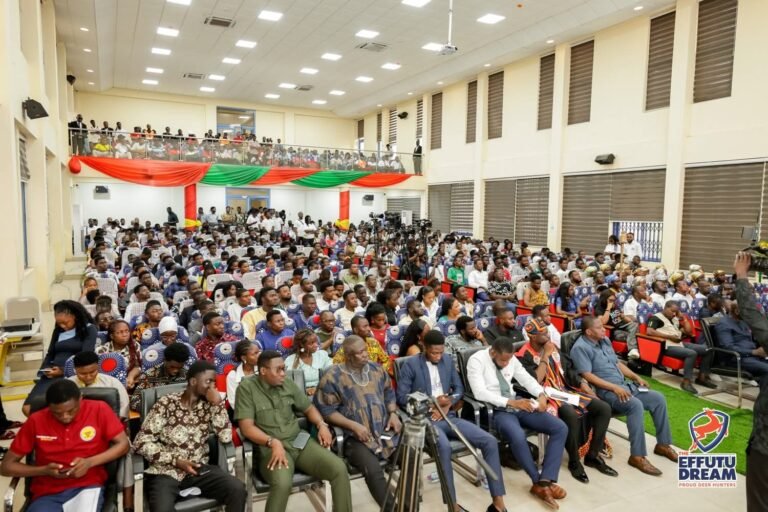
Godfred Yeboah Dame, Attorney-General and Minister of Justice

The Attorney-General and Minister for Justice, Godfred Yeboah Dame, has observed that Ghana’s record in the delivery of social and economic rights, and advancements made in the area of civil and political rights are strong indicators of the nation’s strong human rights record on the global space.
The AG said this when he presented Ghana’s National Report on human rights at the Fourth Cycle of the Universal Periodic Review (UPR) of the United Nations in Geneva, Switzerland.
He highlighted the importance of the UPR as the principal and most successful mechanism of the United Nations Human Rights Council in examining the human rights performance of all the United Nations Member States.
Mr Dame recalled that Ghana, in 2017, accepted and implemented 212 out of 241 recommendations made during the 3rd cycle review. He noted that the nation had made significant progress in its implementation despite a few challenges which the government continues to address through progressive interventions.
Naming records
He singled out the delivery of the Free Secondary School education since 2017, strengthening of other avenues for pre-tertiary education like the Free Compulsory Universal Basic Education programme as well as Technical and Vocational Education and Training institutions.
The AG also cited the launch of the Back to School Campaign aimed at ensuring that children, including pregnant school-going girls and persons with disability, access schools, and ensuring access to adult education through the National Functional Literacy Programme, as powerful indicators of the extension of socio-economic rights to the citizen.
“The denial of social and economic rights can result in regular agitations by the citizenry, and be a spur for instability in any nation. Ghana has made significant progress in the protection of socio-economic rights of her citizens in recent times,” the AG stated at the UN session.
Health rights
On the right to quality health care, Mr. Dame cited interventions like the Newborn Care Policy (2019-2023), aimed at guiding the delivery of neonatal and child health services in Ghana and the implementation of Agenda 111.
“The Agenda 111 is aimed at building 111 district hospitals across the country in order to improve geographical accessibility for healthcare services…The use of drones for the aerial delivery of emergency health commodities and blood to hospitals and health facilities in remote areas, the use of mobile clinics fully equipped with clinical-electrical equipment in remote communities and the acquisition of over 307 state-of-the-art ambulances for all 260 districts in Ghana, to enhance access to healthcare in emergency situations, have been critical in improving access to health care,” he noted.
Mr. Dame further stated that a new Mining and Minerals Bill had been prepared to make provisions on affirmative action towards bringing more women into the industry.
That, he said, will enhance the obligations of mining firms to the Government and host communities, as well as impose mandatory Corporate Social Responsibility requirements on firms.
He added that the passage of the Cyber Security Act, 2020 had also provided specific provisions towards preventing and combating online child sexual exploitation and abuse.
Corruption
He stressed that Ghana had since 2017 taken major steps towards strengthening efforts to combat corruption. Some of these steps include the establishment of the Office of the Special Prosecutor under the Special Prosecutor Act, 2017 (Act 959) to investigate and prosecute corruption, bribery and related criminal cases.
He described the setting up of the Office of the Special Prosecutor as “the single most courageous and significant legislative reform since independence to give impetus to the fight against corruption, as it resulted in a delegation of the prosecutorial powers of the Attorney-General in the area of corruption and corruption-related offences to an independent body”.
He also referred to the passage of the Witness Protection Act, 2018 (Act 975), the passage and full application of the Right to Information Act, 2019 (Act 989), the enactment of the new Companies Act, 2019 (Act 992) which introduces a variety of measures to ensure timely provision of information to be entered in the companies register and the concept of beneficial ownership amongst others, as further indicators of efforts to root out corruption.
Civil/political rights
On civil and political rights, the AG pointed out that the phenomenon of brute violence by police officers in Ghana is on the decline following the introduction of deliberate training of all police officers not to engage in acts of torture in the conduct of their duties.
He also highlighted the passage of the Criminal and Other Offences (Procedure) (Amendment) Act, 2022 (Act 1079) to formally introduce plea bargaining into the criminal jurisprudence of Ghana in respect of most offences.
According to Mr. Dame, Ghana’s Justice for All Programme has been a major vehicle for alleviating prison overcrowding.
The AG emphasised that Ghana remains committed to ensuring the rights related to name, identity and nationality are protected.
In this regard, he alluded to steps by the Government to strengthen these rights including the use of technology to register births; the free registration policy for children below the age of one; the visit by officers of the Births and Deaths Registry to refugee camps to register new births of refugees, asylum seekers and migrants who live in the camps.




